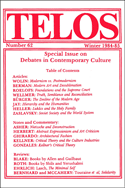By Peter Yoonsuk Paik · Tuesday, November 6, 2018 Peter Yoonsuk Paik’s “The Korean Wave and the Impasse of Theory” appears in Telos 184 (Fall 2018), a special issue on Korea. Read the full article at the Telos Online website, or purchase a print copy of the issue in our online store. Individual subscriptions to Telos are available in both print and online formats.
South Korean popular culture has achieved startling success across much of the globe during the past decade. The first transnational form of popular culture that is not the legacy of an imperial project, the efforts to understand the significance of the “Korean wave” have been hampered by dominant scholarly approaches in the humanities that are not capable of grasping both its emergence and its appeal. This article argues that a key reason for the appeal of South Korean television and film is the fact that they explore the clash between tradition and modernity. South Korean media resonates with peoples across the world who are living out the conflicts between tradition and modernity and are thus eager for models for negotiating the competing demands of the two.
Continue reading →
By Beau Mullen · Wednesday, January 22, 2014 As an occasional feature on TELOSscope, we highlight a past Telos article whose critical insights continue to illuminate our thinking and challenge our assumptions. Today, Beau Mullen looks at Martin Jay’s “Hierarchy and the Humanities: The Radical Implications of a Conservative Idea” from Telos 62 (Winter 1984).
 The notion of “high culture” has been under attack in different ways by critics, academics, and the general public for generations. Moreover, as Western culture becomes increasingly commercialized, egalitarian impulses have exiled much of what was considered by many to be high culture to obscurity, appreciated mainly by a minority who are themselves regarded as cultural elitists. Popular or mass culture appears to now reign supreme, but this does not mean that cultural hierarchy has been brought to an end. Cultural hierarchy still has its defenders, and as Martin Jay suggests in his 1984 Telos article “Hierarchy and the Humanities: The Radical Implications of a Conservative Idea,” it clearly has a place in current cultural evaluations. The notion of “high culture” has been under attack in different ways by critics, academics, and the general public for generations. Moreover, as Western culture becomes increasingly commercialized, egalitarian impulses have exiled much of what was considered by many to be high culture to obscurity, appreciated mainly by a minority who are themselves regarded as cultural elitists. Popular or mass culture appears to now reign supreme, but this does not mean that cultural hierarchy has been brought to an end. Cultural hierarchy still has its defenders, and as Martin Jay suggests in his 1984 Telos article “Hierarchy and the Humanities: The Radical Implications of a Conservative Idea,” it clearly has a place in current cultural evaluations.
Continue reading →
|
|
 The notion of “high culture” has been under attack in different ways by critics, academics, and the general public for generations. Moreover, as Western culture becomes increasingly commercialized, egalitarian impulses have exiled much of what was considered by many to be high culture to obscurity, appreciated mainly by a minority who are themselves regarded as cultural elitists. Popular or mass culture appears to now reign supreme, but this does not mean that cultural hierarchy has been brought to an end. Cultural hierarchy still has its defenders, and as Martin Jay suggests in his 1984 Telos article “Hierarchy and the Humanities: The Radical Implications of a Conservative Idea,” it clearly has a place in current cultural evaluations.
The notion of “high culture” has been under attack in different ways by critics, academics, and the general public for generations. Moreover, as Western culture becomes increasingly commercialized, egalitarian impulses have exiled much of what was considered by many to be high culture to obscurity, appreciated mainly by a minority who are themselves regarded as cultural elitists. Popular or mass culture appears to now reign supreme, but this does not mean that cultural hierarchy has been brought to an end. Cultural hierarchy still has its defenders, and as Martin Jay suggests in his 1984 Telos article “Hierarchy and the Humanities: The Radical Implications of a Conservative Idea,” it clearly has a place in current cultural evaluations. 






